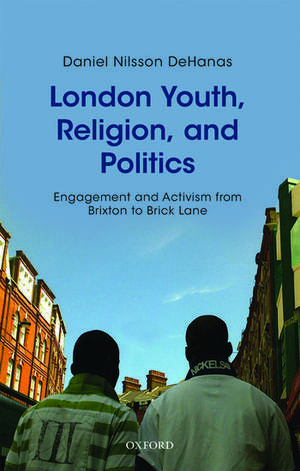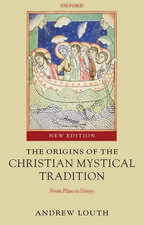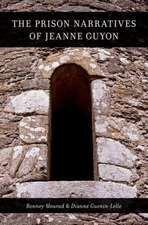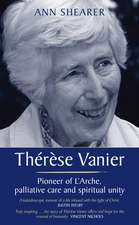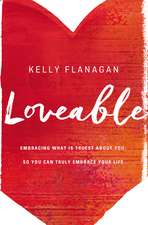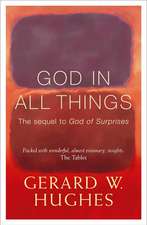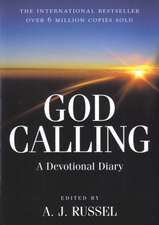London Youth, Religion, and Politics: Engagement and Activism from Brixton to Brick Lane
Autor Daniel Nilsson DeHanasen Limba Engleză Hardback – 30 iun 2016
Preț: 584.85 lei
Preț vechi: 840.50 lei
-30% Nou
Puncte Express: 877
Preț estimativ în valută:
111.91€ • 115.45$ • 93.39£
111.91€ • 115.45$ • 93.39£
Carte tipărită la comandă
Livrare economică 15-21 martie
Preluare comenzi: 021 569.72.76
Specificații
ISBN-13: 9780198743675
ISBN-10: 019874367X
Pagini: 250
Dimensiuni: 142 x 224 x 20 mm
Greutate: 0.42 kg
Editura: OUP OXFORD
Colecția OUP Oxford
Locul publicării:Oxford, United Kingdom
ISBN-10: 019874367X
Pagini: 250
Dimensiuni: 142 x 224 x 20 mm
Greutate: 0.42 kg
Editura: OUP OXFORD
Colecția OUP Oxford
Locul publicării:Oxford, United Kingdom
Recenzii
One of DeHanas'smain strengths is the way in which the depth of his fieldwork resonates throughout the volume, providing the reader with much richness and detail.
this is a very timely and worthwhile book that successfully illustrates the complex struggles of second-generation youth -- regardless of ethnicity and religion -- showing that they are as active as their peers and finally, that in some contexts, religion plays a role in the articulation of (political) identities and modes of civic participation.
DeHanas has provided a valuable, empirically rich text that is theoretically informed and contributes to increasing our understanding of diversity, integration and to what degree different forms of Christianity and Islam influence the daily lives of young people in a global city. This comparative approach is a useful corrective to the constant exceptionalisation of British Muslim young people and offers a nuanced enquiry into types of British African-Caribbean youth religiosity.
Apart from American classics such as Will Herberg's Protestant-Catholic-Jew (1955) religion is often missing from research on immigration, ethnicity and identity. One valuable aspect of this study is that religion plays a central role in his analysis and conclusions, in which black Jamaicans often have a connection to evangelical Protestantism, especially Pentecostalism, and Bengalis invariably come from families in which Islam is the key component of culture and identity. Thus DeHanas seeks to weigh the influences of race, ethnicity, religion and citizenship in the formation of identity.
This book is outstanding in that it focuses on one city, London, and compares the political and social evolution of second-generation British youth of different migrant origins: British Muslim Bangladeshis, British Christian Jamaicans, and nonreligious youth. It is original because no other book to my knowledge to date has presented such a comparative study and comprehensive findings on the integration process of youth from different immigrant ethnic backgrounds.
This is an interesting, well-written, and engaging volume with some intriguing key findings. One of DeHanas's main strengths is the way in which the depth of his fieldwork resonates throughout the volume, providing the reader with much richness and detail.
The author adeptly goes into beautiful narrative detail of his interactions during ethnographic observation with local community people and members of churches and mosques. It is certainly thought-provoking when DeHanas emphasizes that mosques focus on the "communal" impact of the individual, while churches tend to focus on the more individualistic, subjective self.
This dense and carefully argued book provides a wealth of information about the implications of "decultured" Islam or "de-ethnicized" evangelicalism for the youth, especially vis-à-vis the integration of second-generation immigrants as engaged citizens. ... Students of migration, religion, and race will greatly benefit from its insightin particular, its reflection on how race, ethnicity, and religion intersect for immigrants' integration.
Daniel Nilsson DeHanas' empirically driven analysis should be read, marked, learned and inwardly digested by all those who care about our democratic future and the place of second-generation migrants in this. I commend it warmly.
Drawing on a much-needed comparative study, DeHanas provides a fascinating insight into the civic integration and political participation of British Muslim, Christian and non-religious young people in a changing Britain.
What distinguishes this book ... is the way it engages with questions about religion and its influence on civic engagement, social action, and national identity. Although not exclusively focused on religious individuals, DeHanas recruited a large portion of his participants within and around religious institutions and, more unusually, uses ethnographic insights to trace the influence and popularity of such institutions and their leaders on young ethnic minority populations ... London Youth, Religion and Politics contains a wealth of resources for characterising and understanding such knowledge systems among ethnic minority religious traditions and thus contains valuable lessons for scholars working in ethnic studies, urban studies, the sociology of religion as well as in other academic disciplines
this is a very timely and worthwhile book that successfully illustrates the complex struggles of second-generation youth -- regardless of ethnicity and religion -- showing that they are as active as their peers and finally, that in some contexts, religion plays a role in the articulation of (political) identities and modes of civic participation.
DeHanas has provided a valuable, empirically rich text that is theoretically informed and contributes to increasing our understanding of diversity, integration and to what degree different forms of Christianity and Islam influence the daily lives of young people in a global city. This comparative approach is a useful corrective to the constant exceptionalisation of British Muslim young people and offers a nuanced enquiry into types of British African-Caribbean youth religiosity.
Apart from American classics such as Will Herberg's Protestant-Catholic-Jew (1955) religion is often missing from research on immigration, ethnicity and identity. One valuable aspect of this study is that religion plays a central role in his analysis and conclusions, in which black Jamaicans often have a connection to evangelical Protestantism, especially Pentecostalism, and Bengalis invariably come from families in which Islam is the key component of culture and identity. Thus DeHanas seeks to weigh the influences of race, ethnicity, religion and citizenship in the formation of identity.
This book is outstanding in that it focuses on one city, London, and compares the political and social evolution of second-generation British youth of different migrant origins: British Muslim Bangladeshis, British Christian Jamaicans, and nonreligious youth. It is original because no other book to my knowledge to date has presented such a comparative study and comprehensive findings on the integration process of youth from different immigrant ethnic backgrounds.
This is an interesting, well-written, and engaging volume with some intriguing key findings. One of DeHanas's main strengths is the way in which the depth of his fieldwork resonates throughout the volume, providing the reader with much richness and detail.
The author adeptly goes into beautiful narrative detail of his interactions during ethnographic observation with local community people and members of churches and mosques. It is certainly thought-provoking when DeHanas emphasizes that mosques focus on the "communal" impact of the individual, while churches tend to focus on the more individualistic, subjective self.
This dense and carefully argued book provides a wealth of information about the implications of "decultured" Islam or "de-ethnicized" evangelicalism for the youth, especially vis-à-vis the integration of second-generation immigrants as engaged citizens. ... Students of migration, religion, and race will greatly benefit from its insightin particular, its reflection on how race, ethnicity, and religion intersect for immigrants' integration.
Daniel Nilsson DeHanas' empirically driven analysis should be read, marked, learned and inwardly digested by all those who care about our democratic future and the place of second-generation migrants in this. I commend it warmly.
Drawing on a much-needed comparative study, DeHanas provides a fascinating insight into the civic integration and political participation of British Muslim, Christian and non-religious young people in a changing Britain.
What distinguishes this book ... is the way it engages with questions about religion and its influence on civic engagement, social action, and national identity. Although not exclusively focused on religious individuals, DeHanas recruited a large portion of his participants within and around religious institutions and, more unusually, uses ethnographic insights to trace the influence and popularity of such institutions and their leaders on young ethnic minority populations ... London Youth, Religion and Politics contains a wealth of resources for characterising and understanding such knowledge systems among ethnic minority religious traditions and thus contains valuable lessons for scholars working in ethnic studies, urban studies, the sociology of religion as well as in other academic disciplines
Notă biografică
Daniel Nilsson DeHanas is Lecturer of Political Science and Religion at King's College London. He is Editor of the journal Religion, State and Society.
